Peter MALONE
Turning Red

TURNING RED
US, 22, 100 minutes, Colour.
Voices of: Rosalie Jiang, Sandra Oh.
Directed by Domee Shi.
Unfortunately, this reviewer has very few qualifications for reviewing Turning Red. Yes, seen many films, but watched all the Pixar films. But he has never been a 13-year-old girl, a 13-year-old North American girl with Chinese background, never had a 13-year-old sister or niece, never been a mother trying to cope with a 13-year-old daughter, so has to accept at face value that Meilin, a perfectionist 13-year-old who normally gets 100% for every school project, who always measures up to her perfectionist demanding mother, is real. Of course, she is an animated character, short, bespectacled, smart-mouthed at times, but the film is inviting us to identify with her, the beginning of puberty, a motley trio of girlfriends at school, the burgeoning attraction to boys, the intense desire to go to a concert of boy-singers.
Where the identification is challenged is in our discovery that when Meilin gets really upset, something inside wanting to burst out of her – it does. And, it is a large red panda, big ears, fluffy tail. At first, Meiliin is dismayed, and we can empathise with her alarm, trying to conceal it, looking in the mirror, trying to hide.
Actually, interest is a bit aroused as to how this could possibly be. The family owns a shrine in Toronto, a family shrine, respecting the elders, with mythological stories handed down, especially about a female warrior who in battle, transforms into a red panda. Ultimately, we discover that this is prevalent in all the female generations, Meilin’s mother (a rather ferocious panda when it is released) and grandmother, along with quite a number of aunts. There is a ritual, when the moon is red, and a circle is drawn, and the panda is fixed in the circle, the women singing and chanting, an elder performing a ceremony for the exorcism of the panda.
But, should this be the case? Is there a value in having an inner panda? Of acknowledging the truth within oneself and setting it free? Not subservient to perfectionism and obedience which dominate at times, especially when mother and daughter sweep the shrine clean, almost obsessive-compulsive disorder.
There are some comedy episodes with the three friends. There are some comedy episodes with some of the boys, especially one who wants the panda to perform at his birthday party – and, ultimately, gets far more than he paid for.
Which means, probably, that this is a film for girls 13 plus or minus who can identify, presumably, with Meilin and her large red panda experiences. Not sure that 13 plus or minus boys will want to go along for the ride. There is a very nice father in the picture, rather quiet, but supportive, and, right at the end of the credits, revealing himself as a fan of the boy singers. The other principal demographic for Turning Red is probably mothers and grandmothers, hoping to understand their daughters and their respective pandas, remembering their past and however their panda, at age 13, troubled them – and made them assertive!
- The popularity of Pixar films? Animation? Themes? Audience identification? Serious and comic?
- Toronto locations, homes, school, the shrine, the concert? The character styles? The voices? Music, songs – and Billy Eilish?
- Meilin and her story, the family, traditions, the Chinese heritage, young girls in Canada, at home, a strict mother, her easy-going father? At school, perfectionist, 100%? The three girlfriends and the bonding? Discovering boys, at the Daisy Mart – and her mother going in and verbally assaulting the young man? Boys at school? The poster for the concert, the 4+ boys when really five?
- The routines, at home, with the girls, her compulsion for cleaning, going to the shrine, working with her mother? The tours of the shrine? The background story, the warrior?
- Meilin at 13, beginning of puberty, her moods, some in a rebellion against her strict mother, the first manifestation of the red panda, her alarm, the mirror, fluffing her ears, her tail? Moving in and out of panda situation? Causing mayhem and disturbance in the house?
- The appearance of the red panda, appearing and disappearing? At school, her escape, leaping over the roofs in the city? The effect on her girlfriends? The different characters, manners, ways of speaking, enthusiasms?
- The boys, the reactions?
- Her mother’s concern, the shrine, the elder, the rituals? Her mother’s confession about her past?
- The arrival of the grandmother and the aunts? Dominating, in the house?
- The issue of the boy singers, the concert, getting the wrong date, the booking for the party, Meilin confined to the house, her getting away, arriving just in time, the raucous celebrations and everybody enjoying the party? Her mother’s arrival, scattering everyone? The issue of going to the concert, her denying her friends?
- The rituals, the red moon, the circles, everybody chanting, the elder and the ceremony?
- The mother, her panda, fears, her relationship with her mother? Meilin and the ceremony, her change of heart, wanting her panda? Her imagination, lost in the woods, the other pandas?
- The concert, the girls buying the tickets, Meilin arriving, the enjoyment, her mother, gigantic, the attack on the stadium, mayhem?
- The final ritual in the stadium, everybody becoming pandas, dragging the mother into the circle, the fading moon, everybody singing, including the boys from the concert? The ritual, all the pandas going through the barrier, the release?
- The setting of the situation? Accepting the panda within, release for a balanced life rather than to perfectionism?
Tour de Pharmacy
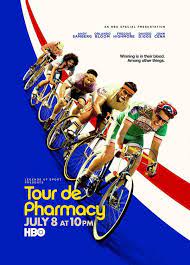
TOUR DE PHARMACY
US, 2017, 40 minutes, Colour.
Andy Samberg, Orlando Bloom, Freddie Highmore, Joe Buck, Nathan Fielder, Daveed Diggs, John Jr, James Marsden, Maya Rudolph, Danny Glover, Mike Tyson, Julia Ormond, Jeff Goldblum, Adewale Akinnuoye-Agbaje, Lance Armstrong, Dolph Lundgren, Eric Nenninger, Kevin Bacon, Will Forte, Chris Webber, Phylicia Rashad, J.J.Abrams, Edgar Wright, Chris Romano. Narrated by Jon Hamm.
Directed by Jake Szymanski.
The satire comes from the team who made Seven Days in Hell, a parody of tennis competitions, written by Miller and produced by Andy Samberg who also stars in this film.
As can be seen, the title refers to the Tour de France, a perspective on drugtaking, the use of banned substances, deceptions. This is highlighted by the presence of Lance Armstrong – which some might find in dubious taste given his deceptions over the many years. His presence is satirical, in the dark, then all kinds of accidents to reveal who actually is, his comments about doping and the Tour de France.
Because of doping, disqualifications, accidents, this version of the bike ride finishes up with only five finalists. They are presented in the tour of 1983 – and older actors portraying them in later life. Andy Samberg plays a white writer from Nigeria with Jeff Goldblum as his older self. There is also Freddie Highmore as a woman, disguising herself as a man, infatuated with Andy Samberg, sacrificing herself in an accident so that he can continue to win. The older woman is played by Julia Ormond, finally revealed to be in prison because of the incident. There is also Daveed Diggs an African-American rider, billed as the first to win the Tour de France. However, along the way, he is distracted by a local girl and goes to work on the farm. Fortunately, he is able to rejoin and win. The older man is played by Danny Glover. There is also the musclebound John Cena overdoing the muscles, played in later age by Dolph Lundgren. There is also a rider played by Orlando Bloom, overdoing the drugs, becoming unconscious as he rides, crashing over the cliff.
There are a number of commentators also satirical on race commentary, Joe Buck as himself, Nathan Fielder as the head of supervising drugtaking, testing out the drugs on himself, Maya Rudolph with all kinds of caustic comments. Kevin Bacon also appears as a shady official who takes all kinds of bribes. The British commentator is played by James Marsden who rides along with the cyclists and is deemed to have the possibility of winning the race.
There are comic interludes from Phylicia Rahsad and, commentary by J.J.Abrams and director, Edgar Wright. And commentary by Mike Tyson.
For those who appreciate this kind of television satire, very funny. But, it seems it depends on your sense of humour.
Notes from the Field
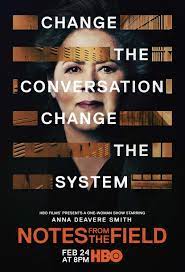
NOTES FROM THE FIELD
US, 2018, 80 minutes, Colour.
Anna Deavere Smith.
Directed by Kristi Zea.
This is an extraordinary tour de force by actress Anna Deavere Smith who conceived the idea, turned it into a stage experience and then adapted it for HBO television.
Action is mainly on stage with projected backgrounds. Anna DeVere had Smith plays 18 roles, comparatively brief vignettes. And for most of the time she is accompanied by a musician on stage. Later in the production, there is material including a speech by Barack Obama, the police killing, funeral, grief.
The 18 characters range from male to female, old and young, all African-American. They are based on actual characters and incidents, highlighting the slave background of the African Americans, the US heritage, the taking of black lives, Black Lives Matter, ranging around different states, more sophisticated Pennsylvania to some of the back blocks of South Carolina. The film takes up all the prominent themes that concern African-Americans.
There are also some quotations from actual characters including James Baldwin and politician John Lewis, friend of Martin Luther King and Ralph Abernathy.
About Notes From the Field from the HBO website
A full production of Anna Deavere Smith’s Notes from the Field opened in late 2016 at the American Repertory Theater in Cambridge, Massachusetts, and immediately transferred to off-Broadway, opening at Second Stage Theater in New York. In this unique one-woman show, Smith dramatized the accounts of students, parents, teachers and administrators affected by America’s school-to-prison pipeline, which pushes underprivileged, minority youth out of the classroom and into incarceration.
The HBO Films presentation focuses on the lack of opportunity and resources for young people living in poverty, which often leads them into the criminal justice system. Smith fearlessly brings to life the stories of 18 real-life people in the one-woman show, among them current and former inmates, protestors, educators and politicians. Shining a light on a lost generation of American youth, Notes From the Field is an expression of community, positivity and, ultimately, hope by inspiring awareness and change.
Enlightening and empathetic, the film tackles questions of race and class through compelling first-person stories, drawing on the accounts of well-known figures like Rep. John Lewis, NAACP Legal Defense Fund president Sherrilyn Ifill, and activist Bree Newsome, as well as everyday people struggling in a broken system. Culled from hours of interviews conducted by Smith with more than 250 people across the country, Notes From the Field showcases her extraordinary gift for transforming herself into diverse characters as she recreates each person’s speech patterns, movements and emotions. Filmed in front of a live audience and intercut with haunting video footage and photographs, Notes From the Field features accompaniment by jazz bassist Marcus Shelby.
The full stage production of Notes From the Field serves as a centerpiece of Smith’s social-justice initiative, The Pipeline Project, which began in
2013 and seeks to extend the conversation of pressing issues beyond theater and into America’s communities. The film is a Playtone production; executive produced by Gary Goetzman and Anna Deavere Smith; conceived and written by Anna Deavere Smith; directed by Kristi Zea.
Jeepers Creepers 3
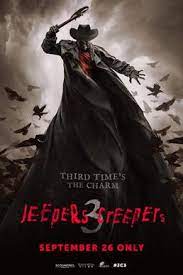
JEEPERS CREEPERS 3
US, 2017, 100 minutes, Colour.
Stan Shaw, Jonathan Breck, Gabriel Haugh, Brandon Smith, Meg Foster, Chester Rushing, Ryan Moore.
Directed by Victor Salva.
Writer-director Victor Salva created the small horror franchise, Jeepers Creepers, making two episodes in the early 2000 is. He then returned 14 years later for this third film. In 2021, other filmmakers took up the ideas for Jeepers Creepers: Reborn.
While the film evokes the atmosphere of the first two films, a monstrous character, ability to fly, to descend on the unwary, who appears to feed from humans to stay alive, the presentation here is fairly standard, smaller budget, especially for special effects.
The film opens with darkness and an attack on the Road, various officials trying to combat the monster, present is the sheriff, Stan Shaw, who remembers the former presence of the monster 23 years earlier. Throughout the film he is in pursuit of the monster, tough and resolute. He is partnered with a concern sheriff, often timid, finally confronting the monster. There are various other characters around the country town who become involved.
There is also a personal story, family memories of the monster, especially the grandmother played by Meg Foster. There is also the younger generation, working in the town, working on the farm, for teenagers riding their bikes and taunting the monster – fatally. It is also an earnest young man in the town who is devoted to one of the family who has a passion for riding a horse.
So, with the human element and the horror elements, there is a combination of pleasantness and alarm – and, perhaps borrowing from Stephen King’s It, a theory that the monster will appear every 23 years and stay for 23 days, replenishing from human victims.
Ascension/ 2021
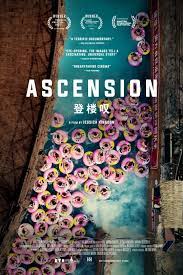
ASCENSION
US, 2021, 95 minutes, Colour.
Directed by Jennifer Kingdon.
An extraordinary array of visuals. However, no voice-over, no clear narration thrust.
For those who appreciate the visuals, they will be more than satisfied. For audiences who want some backgrounding, some information, some interpretation – it is over to the audience themselves.
The film opens with a quotation from the great-grandfather of the director (who was also responsible for screenplay, photography, editing). He speaks of people looking up to ascend a tower, out of reach, growing problems. (And it ends with the ascent of the tower and the climber looking around and seeing that everything has been razed.)
By the end of the film, audiences may well be amazed at how much footage the director has been able to photograph in China itself, a seeming freedom movement, freedom to encounter all kinds of people, in training, instructors, management. In fact, this is a very strong visual film about capitalism, all the more surprising since the setting is the People’s Republic of China, ruled by a Communist government, with socialist aims. However, we are well aware that there are many millionaires in China, Chinese investment in property all over the world, Chinese involvement in casinos and Chinese highrollers.
There is a development in the presentation of the images, something like the cinema equivalent of a gallery installation, the audience moving from one image to the next. The development spends a considerable amount of time at the opening of the film showing the range of men and women trying to get jobs, the spruiking of jobs, the low payment, working conditions, and then a collage of detailed and repetitive work, literal hands-on, yet vast machinery, workers at a factory producing bottled water.
The development keeps going up the stages, to the training of men and women for more upmarket jobs – although, with mention of Downton Abbey, there seems to be some emulation of repeating that British lifestyle amongst the affluent families in China, training to be butlers, to lay tables with precision (perhaps they should check Remains of the Day). And it moves on to upper management, well-dressed young men and women, being instructed by experts whom they applaud. And the levels of management go higher.
In the meantime, there is a more physical training of police men and women, much more regimented, with touches of violence by the instructors. Some martial arts.
Ultimately, there is social gatherings, parties, dinners, with speeches from the CEOs of vast businesses, urging improvement of production, rivalling the US, wanting to outdo it in particular markets.
Which means then that this vision of China is not exactly what the revolutionaries of 1949 may have had in mind, nor those during the Cultural Revolution, but a gradual change of perspective with greater wealth, international markets, greater communication – and, as everywhere else, the young people are seen bent over their mobile phones. And some playing computer games.
This is a very urban scene, not a farmer insight, not a country village, not a poor neighbourhood. We do see some domestics and cleaning, some grounds people (someone hunched in the heat while a petulant model being photographed complains about how hot it is).
Nominated for an Oscar for Best Documentary.
One of a Kind Love
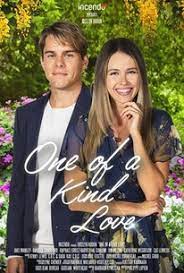
ONE OF A KIND OF LOVE
Canada, 2021, 90 minutes, Colour.
Jocelyn Hudon, Jake Manley, Daniela Sandiford, Raphael Grosz-Harvey, Alain Goulem.
Directed by Philippe Lupien.
In making a film for an adult audience you can’t get more G-rated than this. Its plot and characters are niceness personified. The focus is on a working class young woman, Kyra, played by Jocelyn Hudon. She is a manager at a restaurant but also makes jewellery from scraps and what she finds as a pastime, hoping it will become her work and that she finds space for a store on the main street. Her father works in a garage – the nicest father you could find.
The other central character is the son of the wealthy family who owns the country club in the town, Ryan, played by Jake Manley. He has gone away to study, has an MBA, is talented at giving advice on improving companies, is in line for promotion to London. He has returned home, has clashed with Kyra in the past – but, they smart, they talk, they work with each other, he helps her father with his accounts, he is wanting the shopfront that Kyra wants and can’t tell her, is able to advise his father to install the wellness club that he is promoting into the country club.
There is also a competition for jewellery design, Ryan encouraging Kyra to enter, giving her his grandmother’s old costume jewellery, her creating a jewellery piece for his mother’s birthday, other ladies in the house making bookings…
There is also the best friend tennis coach from school days as Well Is the coach’s girlfriend who is the confidante of Kyra. Ryan’s parents are very wealthy, upper social class – but presented favourably as well.
Some moments of triumph with the winning of the competition. Some moments of drama because of the shopfront. But, we know that all will end well, Ryan turning down London and staying to work with his father, be with Kyra, promote her jewellery, live happily ever after.
American Traitor: the Trian of Axis Sally
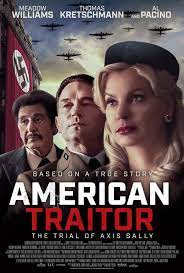
AMERICAN TRAITOR: THE TRIAL OF AXIS SALLY
US, 2021, 106 minutes, Colour.
Meadows Williams, Al Pacino, Thomas Kretschmann, Carsten Norgaard, Swen Hemell, Mitch Pileggi
Directed by Michael Polish.
A drama for those interested in World War II stories, especially background stories from the Third Reich, propaganda stories and Goebbels’ radio broadcasts. The story may not be so well-known even in the United States but even less so throughout the world.
Axis Sally was the radio name given to Mildred Gillars, an American who had gone to live in Germany during the 1930s, partnering with a German with whom she was in love, he a producer for the Nazi propaganda programs. She is sought out by Goebbels and promoted to do a program, first up urging Americans not to enter the war, then comments to the troops about their loved ones and being home, singing songs. The screenplay provides several locations for her to sing songs like Yes, we have no bananas or Lili Marleen. Goebbels has a lust for on her, she taking the opportunity of a revolver to shoot him but it has no bullets. Her passport and documents were taken and, like all the programs, she had a strict written text, supervised by Goebbels, to speak from.
These historical episodes are interspersed throughout the film which is about her trial in Washington DC in 1948.
There is a backlash against Mildred, her being taken to court on eight counts of treason. She always looks glamorous, a glamorous blonde, even in the prison cell, but especially her court presence. She is played by Meadow Williams who produced the film aided by personal finances.
The other star of the film is Al Pacino, aged 80, one of those scenery-chilling performances that he did so well. This is one of the best. Sloppy and dowdy at first, seemingly not interested in the case, he comes into his own at the final defence speech, moving the jury to think about Mildred as a person rather than the Nazi propaganda persona, Axis Sally, reading from the text, pressured by Goebbels, passport gone, the always present possibility of death. He makes the distinction between the persona of Axis Sally and actual Mildred. It is quite a moving speech, especially coming after the rather virulent attack by the prosecutor, played by Mitch Pileggi.
Ultimately, Mildred was found not guilty on seven of the eight charges but found guilty of participating in a play about American soldiers, sentenced to 30 years, serving 12, getting out of jail and returning to Ohio as a teacher.
The film is based on a book by Bill Owen, a naive young lawyer in the film, assisting Al Pacino and taking a lot of flak from him. The book was written by Owen with his son, Vance Owen, who produced the film as well. There is an interview with Bill Owen during the final credits.
- Based on a true story? How well known in the US? Outside the US?
- The settings in Third Reich Germany, social life, Goebbels, broadcasting, the studios, private life? The settings in Washington DC, 1948, the city, legal offices, the court, prison? The musical score?
- The narrative using newsreel footage from the period, the experience of the war, German invasion, Americans entering, result, propaganda against the Americans, the Germans losing the war, D-Day, the Battle of the Bulge, the destruction of Berlin?
- The intercutting of the narratives, the background of Mildred, going to Germany, her life there, relationship with Max, Goebbels attracted, her being employed for radio broadcasts, texts, no deviating, the messages, praising Germany, initially urging America not to join the war, news about the soldiers, their families, the songs? Her relationship with Max, his encouraging her, devising scenarios for the broadcasts? The play and the later consequences? The effect of D-Day, the Christmas broadcasts at the time of the Battle of the Bulge, eighth of April 1945 and the end of the war? Her disappearing? The relationship with Max, true love, his death?
- 1948, Mildred being transferred from Germany to the US, having disappeared? In the prison cell, her appearance, manner, age, the later revelation to Bill Owen about her life, abusive parents, surviving, studies, going to Germany, the bond with Max?
- The introduction to James Laughlin, reputation, manner, the story of the death of the judge collapsing? Deals with the authorities, taking the case? The case of treason, eight counts? His associates, the young woman studying and eventually taking over? The clash with the DA staff? The encounter with Bill Owen, his approach, awkwardness, naivete, having to buy a suit, sitting with Loughlin, being told not to talk, visiting Mildred in jail, listening to her, information for Loughlin?
- The conduct of the case, the jury, the judge, the prosecution, the vigorous speeches by the prosecution, the attack about treason, the emotional impact for the American public? Loughlin and his seeming lack of interest, joking manner, bypassing questions? The development of the case? The seeming hopelessness?
- The device of having the historical development of Mildred’s life and work intercut with the trial? Changing sympathies, understanding the implications of the situation, Mildred in Germany, before the war, the relationship with Max, the encounter with Goebbels, his sexual exploitation of her, her pointing the gun at him, firing, no bullets? The risks, the summons by Goebbels? Possible death?
- The final prosecution speech, patriotism, anger at treason, the effect on the American public?
- Al Pacino, the tour-de-force of his final speech for the defence, the argument about free speech (and Bill trying to use it), the distinction between Mildred and the persona of Axis Sally, Mildred and her being controlled, fear, always the possibility of death, the gun at the head? The appeal to the jury and what they would have done in such circumstances? The issue of whether she had caused any death of an American? The nature of the broadcasts, the songs, giving information to American families (and this visualised) about their sons being alive?
- Bill, the visit to Mildred, her telling her story, his sympathy for her?
- The final verdict, seven counts of not guilty, 30 years for participation in the play? Her serving 12? Out of prison, to Ohio, teaching?
- The credits, the information about the life and death and careers of each of the characters, Bill Owen writing the book in collaboration with his son?
- An interesting look at American war history? The fate of other broadcasters, the British, Tokyo Rose?
Naked/ 1993
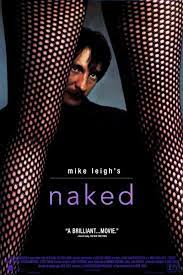
NAKED
UK, 1993, 131 minutes, Colour.
David Thewlis, Leslie Sharp, Katrin Cartlige, Greg Crutwell, Claire Skinner, Peter Wight, Ewen Bremner, Susan Vidler, Deborah McLaren, Gina McKee.
Directed by Mike Leigh.
While Mike Leigh had made many films during the 80s and into the 90s, strong domestic dramas, for television and cinema, as well as his portrait of Gilbert and Sullivan, Topsy Turvey, the success of Naked at the Cannes Film Festival in 1993, winning David Thewlis best actor and Leigh best director, definitely put Leigh on the cinema map. This was confirmed by further success in 1996 with Secrets and Lies. For 25 years Lee made a succession of striking films, more generally about family and interactions but also venturing out to a portrait of the artist, Turner. Leigh was also involved in writing and producing plays.
Naked is particularly grim. It is, so to speak, and naked portrait of its central character, Johnny (although he never appears naked himself). Johnny is from Manchester, seen initially sexually abusing a woman who runs away, then driving to London, to meet up with his former girlfriend, Louise (Leslie Sharp). Johnny is an angry man, a bitter man, self-absorbed, bursting out in rage, bursting out with central passion, violent. He is a kind of 20th century Everyman – or a 20th century anti-Everyman.
Johnny quotes the Bible, Nostradamus, talk about the end of the world – he seems to live in a kind of pre-apocalyptic world.
The screenplay of the film is a series of episodes, Johnny landing at the flat and imposing on Louise, flirtation and sexual behaviour with her rather high flatmate, Sophie (Katrin Cartlige). He encounters a young Scotsman in the city looking for his girlfriend (Ewan Bremner in an early role, Susan Vidler), meets up with a security guard at a fashionable but empty building, Brian (Peter Wight) who allows Johnny in, they talk a lot, Brian revealing something of his lonely life. Brian also looks out a window across to a building with a sensual woman, Johnny eventually going to her, a touch of sadomasochism in his encounter with her. He also encounters a young woman at a cafe, Gina McKee, going home with her, but alienating her and her ousting him. And then he is bashed in the street after an encounter with a man putting up posters who ousts him from his truck and kicks him.
After the bashing, Johnny returns to Louise, alienating Sophie and her escaping, Sandra the owner of the flat coming home suddenly, her boyfriend having imposed himself (Sebastian, Graham Cruttwell) and exploited Sophie. He is the arrogant, self-centred upper-class presumptuous male.
Leigh has tended to be very pessimistic – and, while Louise gives up her job with plans to return to Manchester, hoping to go with Johnny, he packs up and leaves. To where…?
Masterpieces like Secrets and Lies, Vera Drake, Another Year, were still in the future.
- Mike Leigh’s work, Awards?
- The opening in Manchester, dark alleys, night? Travelling to London? London, streets, flats, interiors, the empty building, the woman in the flat, the cafe? Seedy atmosphere? The musical score?
- David Thewlis, his award-winning performance? Johnny, his age, background, Manchester, the relationship with Louise? The opening, the savage sexual attack, the woman running away, denouncing him? Taking the car, the intense drive to London? His purpose?
- Johnny as a morose, raging Everyman or anti-Everyman? The source of his rage? His personality, his intellect and reading, his philosophical reflections? His savage sensuality?
- The encounter with Louise, leaving Manchester, hoping to marry, her job, boring, boarding with Sandra, with Sophie? Her attitudes towards Johnny? Anger, compassion? Looking after Johnny, care for him? Yet his walking out on her?
- The encounter with Sophie, drugs, high-tension, the encounters with Johnny? Friendship with Louise? Sebastian, his arrival, the sexual behaviour, the nurse’s outfit? His callow behaviour, staying in the house? Her growing desperation, Johnnie returning, helping, walking out?
- Sandra, her flat, absent in Zimbabwe, the relationship with Sebastian, returning early, her shock, the three in the bed, Sebastian present, a nursing background, wanting everything tidy?
- Johnny’s succession of encounters? The young Scotsman in the street, his language, searching for his girlfriend, the tick of jerking his head? Searching for his girlfriend? Waiting for Johnny? Johnny finding the girlfriend, her being abusive, staying with him? Their ultimately coming together, angers, leaving? The impact on Johnny? Johnny’s influence?
- The building, standing outside, Brian, eventually letting him in, the conversations, Brian revealing his life, his tedious job, the to-ing and fro-ing of the conversation? Johnny outside, the going for something to eat, Brian and his regrets?
- Looking at woman through the window, Johnny going over, the talk, her attitude, sadomasochism, the sexual encounter, Johnny and his cruel attitudes?
- The encounter with the chauffeur, getting in the car, the chauffeur discovering his error, ousting Johnny?
- The man putting up the posters, the topics, Johnny’s conversation, the van, out of the van, the post and kicking Johnny?
- The alley, the group attacking Johnny, his injuries, struggling back to Louise, the effect, the care, the encounter with Sebastian, Sandra returning?
- The girl at the cafe, forlorn, going home with her, his having the bath, the drink, her talking, getting maudlin, ousting him?
- Johnny, his background, philosophy, Bible and Nostradamus, apocalyptic, his rage, relating with people, savage sensuality, absorbed in himself, abandoning everyone?
Vanquish
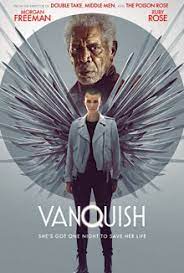
Loveland/ Expired
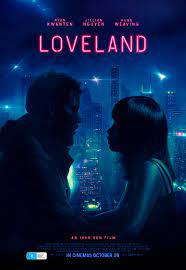
LOVELAND/EXPIRED
Australia, 2021, 105 minutes, Colour.
Ryan Kwanten, Jillian Nguyen, Hugo Weaving.
Directed by Ivan Senn.
This is not an easy cinema experience. There are aspects of science-fiction in a pre-apocalyptic world. There is personal drama and a search for identity. There is a sex club, the Loveland of the title, and one of the performers a refugee from a village in Vietnam. There is also a theme of life, genetic engineering, immortality, death.
The film was released in Australia as Loveland. However, at the same time, the Internet Movie Database lists it as Expired with a poster with that name.
While this is a film financed by Screen Queensland, with some of the interiors shot in Queensland, the setting is Hong Kong, generally Hong Kong by night, the vistas, the skyscrapers, the neon lights, the streets, dingy apartments, the corridors and rooms of the club.
And, this is a film of dialogue, philosophical dialogue, self-ruminating dialogue, rhetorical dialogue, often a succession of monologues by the central characters.
The word that kept coming to mind during the screening was portentous, portentous dialogue, portentous themes and treatment. So, it seemed a good idea before writing the review to check on what was exactly the meaning of portentous. There were some definitions: ‘of or like a portent; of momentous significance’ and ‘done in a pompously or overly solemn manner so as to impress’.
The first definition applies to John, the central character, a hitman for hire (and we see him doing an assassination, without any sense of conscience), unsure of his origins, a white man in the Chinese context, often ruminating about the absence of his mother and his wanting her, going to the sex club, waited on by the management, watching the women rather than any physical contact, their performing and singing behind a glass. All these events were portentous for John, momentous significance for his life and his possible death.
However, the second definition pervaded, especially the solemn manner, maybe overly solemn, poetic, rhetorical, scientific, pre-apocalyptic, issues of life and death, outed as voice-over, as monologues, designed to impress.
The setting is exotic, the issues of life and death and genetic engineering are raised, John discovering a doctor, played impressively, as always, by Hugo Weaving, who has experimented in the past, has his regrets, looks to possibilities for rectifying the situation.
The other exotic aspect is April, the Vietnamese woman who performs at the club, whom John follows, gets to know, forms a relationship – which is partly good for her but partly disturbing, jolting her in her life in Hong Kong and desire to return home to Vietnam and to her daughter.
There is some explicit explanation towards the end of the film as to why John is as he is, his quest to find the doctor, to get an explanation about his mother, and the realisation that powers that be after him to destroy him.
While the release title focuses on the sex club, the alternate, Expired, title focuses on John and his quest – and his destination? Expired seems a better choice for title.
(Ivan Senn is, perhaps, best known for his films with aboriginal themes from Beyond Clouds to Mystery Road and Goldstone. Loveland is a far cry from these themes.)
- Title? The alternate title? The emphases?
- The Hong Kong settings, night, skyscrapers, neon lights, the streets, apartments, the club and corridors, the observation room? Atmosphere? Musical score? Songs and performance?
- John’s story: Ryan Kwanten’s screen presence and performance, persuasive, a white man in the Hong Kong situation, his contacts, locals, migrants from Africa, Japanese…? The initial revelation that he was a hitman, the local police, money, address information, his confrontation of his victim, the pursuit, looking in the eye, shooting him? Conscienceless? The further contacts? His acceptance of himself as a hitman? Age, wandering the city, apartment? No origins? Puzzle about himself, the absence of his mother? Yearning for a mother?
- His visits to the club, the corridors, the other clients shielding themselves, the management and waiting on him, the choice of the girls, lining up, multi-racial, his choice, the performance? The older woman, the physical contact? Discussions about his mother?
- Seeing April, her performance, after which his following her, the conversations, her telling her story, the Vietnam village, her apartment, the talk, unburdening, the interactions, sexual, physical? His return to the club, the audience seeing her return to Vietnam and her daughter?
- His physical health, ailment, concern, dying? The information about the doctors, experiments, life, healing, immortality? Getting the identity of the doctor?
- Finding the dcotor, pursuing him, their discussions? The revelation about his condition, the company, the experiment, his condition? Powers-that-be wanting to control him? His wanting help?
- The doctor, his work, the past, his office, discussions with John, self-recriminations? In his study, laboratories, the intrusions? His future?
- The police, the contact with John, further commissions as a hitman? In the street, his pursuit, the range of characters, multiracial, refugees from Africa? His being ready to shoot, the potential victim with the gun, the men pursuing, the shootout and his surviving?
- John, a future, returning to the club, April not there? His life, his health, possibilities of death, or not…?